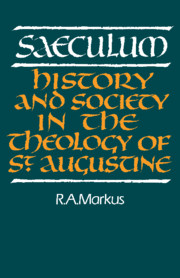Book contents
- Frontmatter
- Contents
- Introduction to the revised edition
- Preface
- Abbreviations
- 1 History: sacred and secular
- 2 Tempora Christiana: Augustine's historical experience
- 3 Civitas terrena: the secularisation of Roman history
- 4 Ordinata est res publica: the foundations of political authority
- 5 Afer scribens Afris: the Church in Augustine and the African tradition
- 6 Coge intrare: the Church and political power
- 7 Civitas peregrina: signposts
- Appendixes
- A History, prophecy and inspiration
- B De civitate Dei, XIX, 14–15 and the origins of political authority
- C Augustine and the Aristotelian revolution of the thirteenth century
- D ‘Sacred history’ and ‘salvation history’
- Bibliographical note
- List of works referred to
- Index
C - Augustine and the Aristotelian revolution of the thirteenth century
Published online by Cambridge University Press: 26 October 2009
- Frontmatter
- Contents
- Introduction to the revised edition
- Preface
- Abbreviations
- 1 History: sacred and secular
- 2 Tempora Christiana: Augustine's historical experience
- 3 Civitas terrena: the secularisation of Roman history
- 4 Ordinata est res publica: the foundations of political authority
- 5 Afer scribens Afris: the Church in Augustine and the African tradition
- 6 Coge intrare: the Church and political power
- 7 Civitas peregrina: signposts
- Appendixes
- A History, prophecy and inspiration
- B De civitate Dei, XIX, 14–15 and the origins of political authority
- C Augustine and the Aristotelian revolution of the thirteenth century
- D ‘Sacred history’ and ‘salvation history’
- Bibliographical note
- List of works referred to
- Index
Summary
Thirteenth-century scholastics were addicted to quoting statements of Augustine's, as of other sancti, as auctoritates in support of their opinions. The conventions of the scholastic employment of auctoritates are now tolerably well known. A modern scholar will not be surprised by frequent divergences between the meaning of such statements in their original setting and the meaning given them by one or other thirteenth-century theologian. Thirteenth-century theologians would have been even less worried by such divergences. Their analysis can, nevertheless, be illuminating. In this Appendix I examine the use made by a number of thirteenth-century writers of Augustine's statements about the origins and nature of political authority and subjection, mainly in the De civitate Dei, Book xix, Chapters 14 and 15. This is one of the points at which we should expect the impact of Aristotelian ideas to show itself most clearly on political thought. It is here that we may best test the validity of the rival claims that the impact of these ideas revolutionised medieval political thought or, alternatively, that they stood in direct continuity with traditional, patristic and especially Augustinian thought-forms.
A. J. Carlyle may serve as representing the more widely held view:
To the Stoics and the Fathers the coercive control of man by man is not an institution of nature. By nature men, being free and equal, were under no system of coercive control. Like slavery, the introduction of this was the result of the loss of man's original innocence, and represented the need for some power which might control and limit the unreasonable passions and appetites of human nature… It was not till Aristotle's Politics were rediscovered in the thirteenth century that Saint Thomas Aquinas under their influence recognised that the State was not merely an institution devised to correct men's vices, but rather the necessary form of a real and full human life.
- Type
- Chapter
- Information
- SaeculumHistory and Society in the Theology of St Augustine, pp. 211 - 230Publisher: Cambridge University PressPrint publication year: 1989



